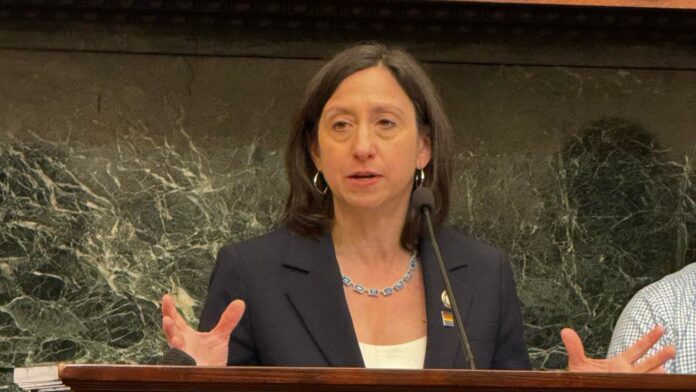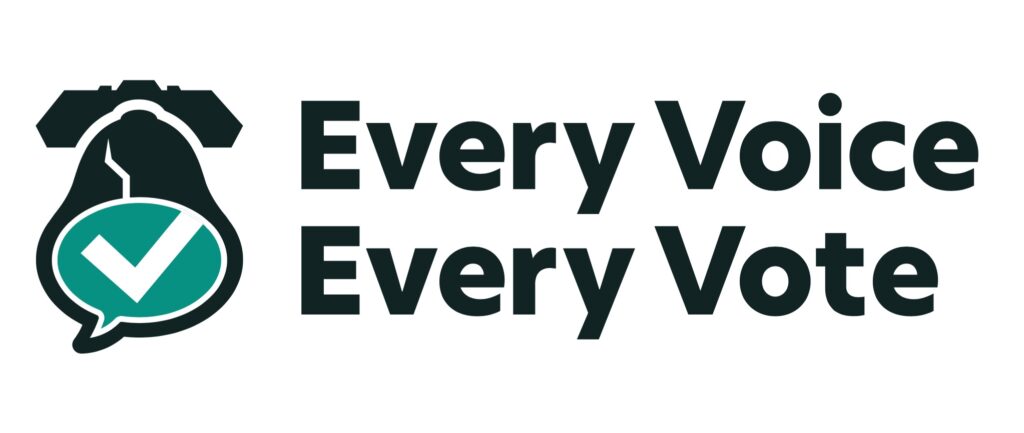
“While Pride is meant to be a time of joy and celebration, it’s also a time of action,” said Councilmember At-Large Rue Landau, the first openly LGBTQ+ person to be elected to city council, at a press conference on June 6 at City Hall after a Pride resolution package she introduced was officially passed.
Three resolutions were announced. The first is an official motion to recognize June 2024 as LGBTQ+ Pride Month in Philadelphia. The second is a response to recent attempts to restrict the rights of trans people and declares the city’s commitment to protect the rights and equal protections of all LGBTQ+ Philadelphians.
“If unjust laws come to Philly from the state or federal government, city council will not stand for them,” she underlined.
The third resolution authorizes the Committee on Legislative Oversight to hold what Landau described as comprehensive hearings to examine disparities experienced by the LGBTQ+ community and explore solutions for achieving equity for LGBTQ+ Philadelphians. These hearings will begin in the fall.
“I have a vision for Philadelphia and a country where LGBTQ+ people can move as their full, authentic, bold — and perhaps most importantly, unafraid selves every single day of the year, not just during June,” Landau added.
Various local and state government officials as well as LGBTQ+ community leaders were present for the press conference. Some held LGBTQ+ affirming signs as they stood near a podium where speakers addressed the crowd.
PGN Publisher Mark Segal, an early LGBTQ+ rights activist who was present during the Stonewall riots and helped to found various advocacy and community efforts in the years that followed, told those gathered that he first realized he was gay when he was 13 years old.
“We were basically invisible as a people,” he said about the lack of media coverage and representation during the time. “So to find out who I was, I went to the library.”
Segal left that experience feeling like he must be “illegal, immoral, and psychologically unsound,” because the only books he found that explored LGBTQ+ topics described queer identity this way.
He spoke about the intentional efforts to resource the community following the Stonewall rebellion, helping people find medical care, community connections, and support for their specific lived experiences as youth or trans people.
Mayor Cherelle Parker — who called Segal one her own teachers — interjected during Segal’s speech, encouraging him to talk more about that work and history.
They both highlighted Philadelphia as a city where people were seeking LGBTQ+ rights long before it was a more visible movement and as a place where the LGBTQ+ community saw progress before national conversations caught up.

“I’m a proud Philadelphian and I want you to know your history — which is our history, which is the nation’s history,” Segal said. “We have contributed so much to gay pride and the gay movement for equality than any other state or city.”
“We re-commit ourselves together as a city where we are creating an environment where everyone feels safe, they feel accepted, and they feel celebrated,” Parker added.
“We’re specifically focused on action,” said City Council President Kenyatta Johnson. “And on making sure this is the most welcoming city in America.”
When it comes to taking action, the listening sessions will help Philadelphia leaders understand how to better support the queer community. Speakers also noted the importance of addressing the concerns that many already know are an issue for LGBTQ+ people.
“More than one in five transgender Pennsylvanians experience housing discrimination, highlighting the urgent need for inclusive and protected housing policies,” said Councilmember Jamie Gauthier, Chair of the Committee on Housing, Neighborhood Development, and the Homeless. “And for 10% of transgender Pennsylvanians, this discrimination has been so suffocating that they are experiencing homelessness.”
“I hope this time next year, we’re not only celebrating Pride, but we are celebrating inclusive, housing policies for all,” said Tatyana Woodard, executive director of the Ark of Safety — the only shelter in Philadelphia that exclusively houses LGBTQ+ people. “Over the next couple of months, I commit to working with Councilmember Rue…to ensure that needle is moving forward.”
Councilmember Nina Ahmad, chair of the Public Health and Human Services Committee, spoke about her queer child and their trans partner — underlining the importance of supporting young people, gender-affirming care, and mental health initiatives.
“We continue to see attacks perpetrated against transgender individuals at alarming rates,” she added. “And in Pennsylvania, there’s still no legal penalty for crimes motivated by sexual orientation or gender identity. We’ve got to change that.”
Landau presented Andre Carroll, a candidate for state representative, with an embossed copy of the resolutions. Carroll spoke about his experiences as a Black, queer man — underlining that he learned about Black leaders as a youth and felt pride in his Black community and heritage but lacked that same representation for his queer identity. He only recently learned about Bayard Rustin — a Black, gay man who contributed heavily to advancing civil rights for the Black community.
“When people talk about criminal justice, you want to talk about discrimination, racism. You talked about my Blackness, but often, I didn’t hear about my queerness,” he said, vowing to be the representation he needed in the past and to make an intersectional difference for those he represents.
Jasper Liem, executive director of the Attic Youth Center, was also given an embossed copy of the resolutions. He spoke about the negative mental health impact of anti-LGBTQ+ rhetoric and anti-LGBTQ+ legislation, even when that legislation doesn’t directly affect the rights of people in Pennsylvania or Philadelphia.
They underlined that LGBTQ+ youth are more likely to be at risk for certain mental health diagnoses or negative health and mental health experiences, not because of their queer identities but because of the risks and dangers they endure as people who are not safe in their own communities.
“The issue isn’t that I am trans,” Liem noted. “The issue is that I cannot be trans and safe.”
They added that although protections now exist for trans and nonbinary students which prevent teachers and administrators from outing them to their parents or guardians, there are no legal protections for cisgender youth who come out at school (as gay, lesbian, or bisexual, for instance).
“I can’t tell you how much I’ve seen this city grow and change and be supportive,” they said about Philadelphia, urging city leaders to continue to pay attention to the needs and experiences of LGBTQ+ people.
“In a time when we are having all of these [anti-LGBTQ+] bills, resolutions like the one presented by Councilmember Rue Landau — a great friend and advocate for our city — it sends a message to our whole community that Philadelphia will not stand for bigotry, homophobia or transphobia,” Liem said. “In Philly, we protect our LGBTQ community.”

